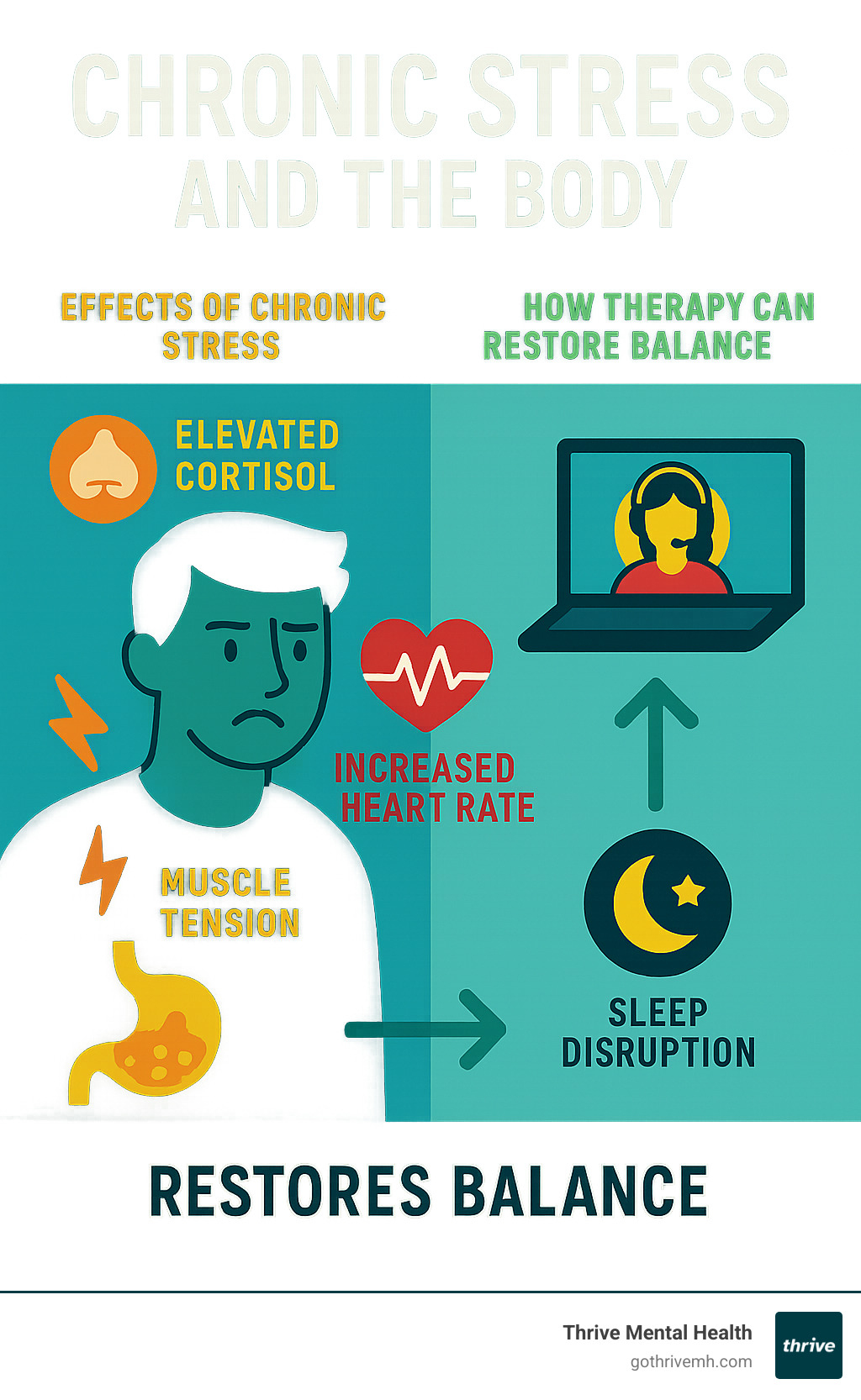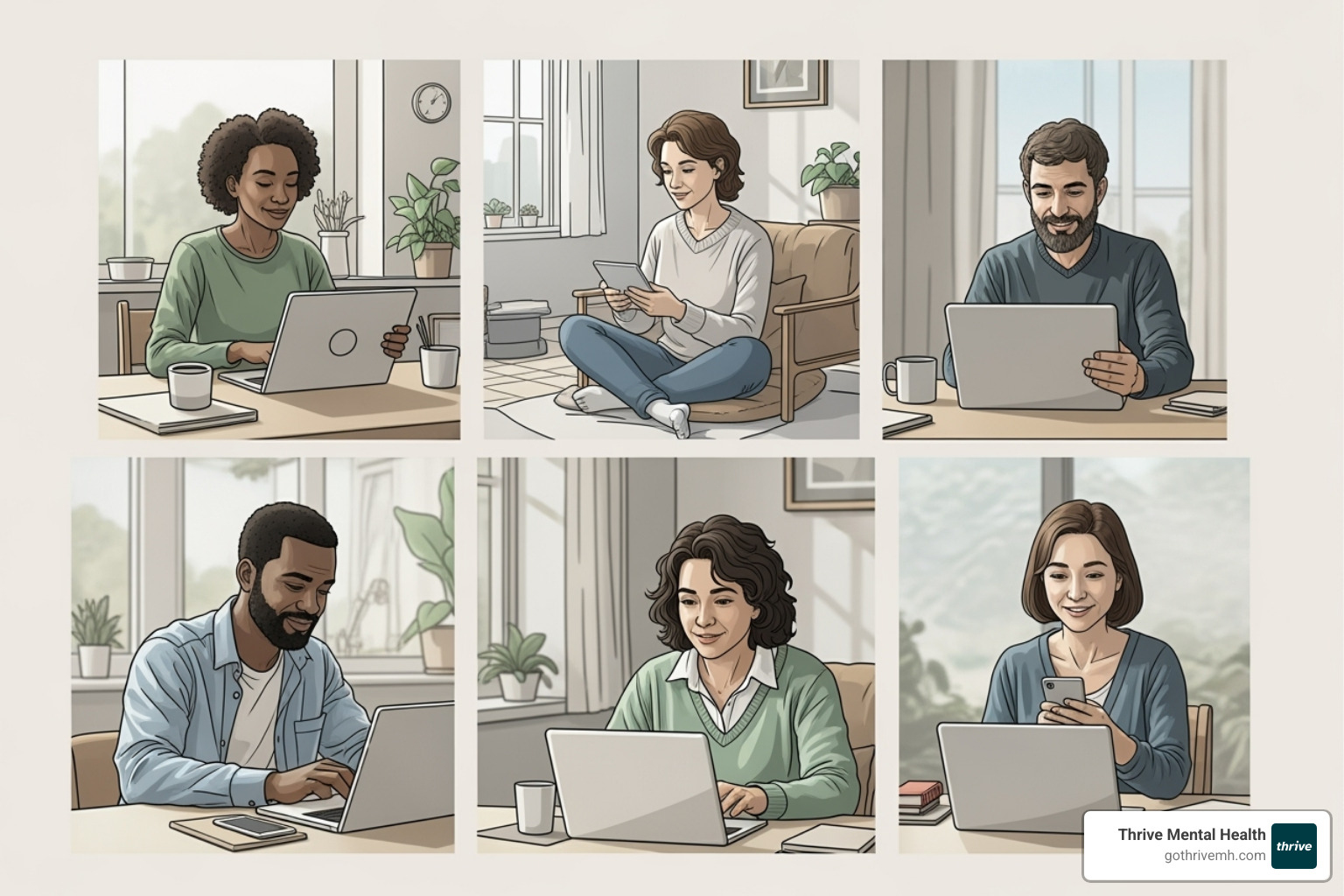Top Online Therapy Platforms to Melt Your Stress Away

Understanding Stress and How Virtual Therapy Can Help
Online therapy for stress offers accessible, evidence-based treatment through secure video sessions, messaging platforms, and phone calls with licensed mental health professionals. Here are your main options:
- Live video sessions – Real-time face-to-face therapy from home
- Phone therapy – Convenient audio-only sessions that fit busy schedules
- Secure messaging – Asynchronous text-based support with daily therapist responses
- Self-guided programs – Structured online modules with therapist oversight
- Intensive virtual programs – Higher levels of care for severe stress and anxiety
Stress has become the silent epidemic of our time. 70% of adults report feeling stressed daily, yet many struggle to find time for traditional therapy appointments. Whether you’re dealing with work pressure, relationship challenges, or life transitions, chronic stress can manifest as headaches, sleep problems, irritability, and difficulty concentrating.
The good news? You don’t have to suffer in silence or rearrange your entire schedule to get help.
Online therapy breaks down the barriers that keep busy professionals from accessing mental health care. Research consistently shows that virtual therapy is as effective as in-person treatment for stress, anxiety, and depression. Platforms now offer everything from quick check-ins via secure messaging to comprehensive video sessions with licensed therapists.
The key is understanding what type of stress you’re experiencing and which online therapy approach fits your lifestyle and needs.
I’m Nate Raine, CEO of Thrive Mental Health, where I’ve helped thousands of clients access online therapy for stress through our virtual intensive outpatient programs and telehealth services. My experience leading both a behavioral health company and healthcare innovation at Lifebit has shown me how technology can make quality mental health care more accessible than ever before.

What is Stress?
Stress is our body’s natural reaction to a perceived threat or demand. It’s an automatic physical, mental, and emotional response designed to help us cope. While often seen as negative, stress isn’t always bad. Think of it as a spectrum, ranging from beneficial to detrimental.
Eustress vs. Distress
On one side, we have “eustress,” which is positive stress. This is the kind of stress that motivates us, sharpens our focus, and adds excitement to life. For example, the pressure before a big presentation or the adrenaline rush during a challenging workout. It helps us grow and perform.
On the other side is “distress,” the type of stress we typically refer to when we say we’re “stressed out.” This is chronic, overwhelming stress that can lead to physical and emotional burnout. It often arises from persistent demands without adequate breaks or coping mechanisms.
Common Stressors
Almost anything can cause stress. Work deadlines, family responsibilities, financial worries, relationship challenges, and major life changes (even positive ones like moving or a new job) are all common culprits. External factors like noise or pollution, and internal factors like perfectionism or a negative outlook, can also contribute.
Physical and Emotional Symptoms of Stress
When stress becomes chronic, it takes a toll on our bodies and minds. Physically, you might experience ongoing headaches, back pain, digestive issues, irregular heartbeats, or persistent fatigue. It can disrupt sleep patterns, leading to insomnia or restless nights.
Emotionally, stress often manifests as irritability, anxiety, sadness, difficulty concentrating, or feeling overwhelmed. It can impact your work life, reducing creativity and productivity. For more detailed information on how stress can manifest as anxiety, you can explore our resources on Anxiety Symptoms.
How Therapy Helps
Therapy, especially online therapy for stress, provides a structured and supportive environment to address these issues. It’s not about eliminating stress entirely – that’s impossible and, frankly, undesirable! Instead, it’s about learning healthier ways to respond to stressors and building resilience.
A therapist helps you understand why you react the way you do, offering unbiased insights and practical tools. They act as an impartial ally, guiding you to develop cognitive and emotional skills, reduce symptoms, and cope with life’s challenges.
Identifying Triggers and Building Coping Skills
One of the primary ways therapy helps is by assisting you in identifying your unique stress triggers. Once you understand what sets off your stress response, you can begin to proactively manage or even avoid those situations.
Moreover, therapy focuses on building a robust toolbox of coping skills. This might include relaxation techniques, mindfulness practices, problem-solving strategies, and communication skills. It helps you challenge negative thought patterns and develop a more adaptive mindset, allowing you to regain control and improve your overall well-being.
Exploring the Landscape of Online Therapy for Stress
The world of mental health care has transformed dramatically over the past decade. What once required driving across town, sitting in waiting rooms, and juggling rigid appointment schedules has evolved into something much more flexible and accessible. Online therapy for stress now brings professional support directly to your living room, office, or wherever you feel most comfortable.
This shift has been particularly beneficial for busy professionals in Florida, where traffic jams and packed schedules often make traditional therapy appointments feel impossible to maintain consistently.

Communication Methods
The beauty of online therapy lies in its flexibility. You’re not locked into one way of communicating with your therapist. Instead, you can choose the method that fits your personality, schedule, and comfort level.
Live video sessions offer the closest experience to traditional face-to-face therapy. You can see your therapist’s expressions, pick up on their body language, and they can do the same with you. Many people find this creates a strong therapeutic connection while still enjoying the convenience of staying home.
Phone calls work perfectly for people who prefer audio-only sessions or find themselves constantly on the move. Maybe you’re more comfortable without the camera, or perhaps you want to take your session during a walk in the park. Phone therapy removes the pressure of being “camera-ready” while still providing real-time connection.
Asynchronous messaging is like having a therapist in your pocket. You can send messages whenever thoughts or stressors arise – whether that’s at 2 AM when you can’t sleep or during your lunch break when work stress peaks. Your therapist typically responds within 24 hours, creating an ongoing dialogue that fits around your life.
Live chat combines the immediacy of real-time conversation with the comfort of text-based communication. It’s particularly helpful for people who process their thoughts better in writing or feel more articulate when typing rather than speaking.
Each method has its place, and many people find that combining different approaches works best for their needs. For a deeper dive into how these virtual approaches can transform your mental health journey, check out our comprehensive guide on Virtual Therapy: A Convenient And Effective Approach To Counseling.
Common Therapeutic Approaches for Stress Management
The good news is that online therapy for stress uses the same proven therapeutic approaches you’d find in traditional therapy. The delivery method has changed, but the quality and effectiveness of the treatment remain just as strong.
Cognitive Behavioral Therapy (CBT) stands out as one of the most effective treatments for stress management. Think of CBT as detective work for your mind. It helps you identify those sneaky thought patterns that turn minor inconveniences into major catastrophes. When you catch yourself thinking “I’m terrible at my job” after one small mistake, CBT teaches you to challenge that thought and replace it with something more balanced and realistic. Our detailed exploration of How CBT Can Transform Negative Thought Patterns shows exactly how this process works in practice.
Dialectical Behavior Therapy (DBT) takes a different but equally powerful approach. Originally designed for people with intense emotional experiences, DBT has proven incredibly helpful for stress management. It teaches four core skills: staying present through mindfulness, tolerating distressing situations without making them worse, regulating overwhelming emotions, and communicating effectively with others. These skills are like having a Swiss Army knife for life’s challenges.
Mindfulness-based therapy focuses on teaching you to observe your thoughts and feelings without getting swept away by them. Instead of fighting stress or trying to push it away, mindfulness helps you notice it, acknowledge it, and respond rather than react. It’s surprisingly effective for breaking the cycle of stress-induced rumination that keeps so many people awake at night.
To explore the full range of therapeutic options available and find what might work best for your specific situation, our A Guide To Common Types Of Therapy And Their Uses provides comprehensive insights into different approaches.
Types of Online Support Services at Thrive Mental Health
At Thrive Mental Health, we understand that stress affects everyone differently. What works for your colleague might not work for you, and that’s perfectly normal. That’s why we offer a range of online support services designed to meet you exactly where you are.
Individual therapy forms the foundation of our services. These one-on-one sessions with a licensed therapist focus entirely on your unique stressors, goals, and circumstances. Whether you’re dealing with work burnout, family pressures, or major life transitions, individual therapy provides a safe space to explore what’s really going on beneath the surface.
Couples therapy recognizes that stress rarely affects just one person in a relationship. When one partner is overwhelmed, it often creates ripple effects that impact communication, intimacy, and overall relationship satisfaction. Our couples therapy sessions help partners understand how stress affects their relationship dynamics and develop strategies to support each other more effectively.
Self-guided programs offer structured learning that you can complete at your own pace. These aren’t generic apps or one-size-fits-all modules. Instead, they’re carefully designed programs that integrate with your overall care plan, often with regular therapist check-ins to ensure you’re getting the most benefit from the material.
Group therapy connects you with others who understand what you’re going through. There’s something powerful about realizing you’re not alone in your struggles. Group sessions provide opportunities to learn from others’ experiences, practice new skills in a supportive environment, and build lasting connections with people who truly get it.
For individuals experiencing more severe or persistent stress that significantly impacts their daily functioning, our Virtual Intensive Outpatient Programs (VIOP) provide comprehensive support without requiring you to put your life on hold. These programs typically involve multiple therapy sessions per week, group support, and coordinated care plans that address stress from multiple angles. You can maintain your work and family responsibilities while receiving the intensive support you need. Learn more about The Benefits Of A Virtual Intensive Outpatient Program (VIOP) to see if this level of care might be right for you.
Can an online therapist prescribe medication?
This question comes up frequently, and the answer requires understanding the different roles of mental health professionals. It’s an important distinction that affects how you plan your care.
Therapists – including Licensed Clinical Social Workers (LCSW), Licensed Professional Counselors (LPC), Licensed Marriage and Family Therapists (LMFT), and Psychologists (PhD/PsyD) – are highly trained professionals who specialize in talk therapy. They’re experts at helping you understand your thoughts, develop coping strategies, process difficult emotions, and create actionable plans for managing stress. However, they cannot prescribe medication.
Psychiatrists, on the other hand, are medical doctors who specialize in mental health. They can diagnose mental health conditions and prescribe and monitor medications to help manage symptoms. Psychiatric Nurse Practitioners (PMHNPs) also have prescribing authority in most states, including Florida.
At Thrive Mental Health, we recognize that comprehensive stress management sometimes benefits from both therapy and medication. While our therapists focus on providing excellent psychotherapy, we also offer integrated Medication management at Thrive Mental Health services through qualified psychiatric providers. This means your talk therapy and any prescribed medications work together seamlessly, with providers who communicate and coordinate your care.
When might you need to see a psychiatrist? If your stress symptoms are severely impacting your ability to work, maintain relationships, or take care of daily responsibilities, a medication evaluation might be helpful. Sometimes medication can provide enough symptom relief to help you engage more effectively with therapy and develop the coping skills you need for long-term success.
The Proven Effectiveness of Seeking Stress Therapy Online
One of the most common questions we hear is, “Is online therapy for stress really as effective as sitting in a therapist’s office?” I get it – it’s natural to wonder if a screen can truly replace face-to-face connection. The good news? Extensive research shows that virtual therapy is just as powerful as traditional in-person sessions.

Comparing Effectiveness: In-person vs. Online
Here’s what might surprise you: multiple studies consistently show that online therapy for stress performs just as well as – and sometimes even better than – traditional therapy. Research shows it is as effective as in-person psychotherapy, which should put any lingering doubts to rest.
When researchers looked at Virtual Cognitive Behavioral Therapy specifically, they found something remarkable. Not only did it match the effectiveness of face-to-face CBT for depression and anxiety, but Virtual CBT can be more cost-effective while delivering the same quality results. This is especially encouraging for busy professionals in Florida who struggle to fit traditional therapy appointments into their packed schedules.
The science behind this makes perfect sense when you think about it. Therapy works because of the relationship you build with your therapist and the skills you learn together. Whether that happens through a computer screen or across a desk doesn’t change the fundamental healing process.
User Satisfaction
But what do real people think? The satisfaction rates tell an incredible story. Studies consistently show that around 80% of users report that online therapy was as effective or more effective than traditional therapy. That’s not just statistical noise – that’s real people experiencing genuine relief from stress and anxiety.
The reviews speak for themselves too. Major online therapy platforms regularly receive thousands of 5-star reviews, with many averaging 4.8 out of 5 stars. When people take time to write reviews about their mental health care, you know they’ve experienced something meaningful.
Convenience Factor
Here’s where online therapy really shines. Convenience isn’t just nice to have – it’s therapeutic in itself. When you don’t have to worry about traffic, parking, or taking extra time off work, you’re more likely to show up consistently. And consistency is everything in therapy.
Think about it: you can have a session during your lunch break, right after the kids go to bed, or even while traveling for work. This flexibility means you get help when you actually need it, not just when your schedule happens to align with your therapist’s office hours.
For our clients in Florida, this has been game-changing. No more rushing across town in traffic or canceling sessions because of unexpected work demands. You can learn more about how this approach transforms mental health care in our guide to Mental Health Care Online.
Cost-Effectiveness
Let’s talk numbers for a moment. Traditional in-person therapy typically runs $125 to $199 per session nationally, and can reach $200-$300 in major cities. Online therapy platforms often cost significantly less due to lower overhead expenses.
This isn’t about cutting corners – it’s about making quality care accessible. When therapy is affordable, you’re more likely to stick with it long enough to see real change. That’s better for your wallet and your mental health.
Key Research Findings on Online Therapy for Stress
The research backing online therapy for stress keeps growing stronger. CBT delivered online has been particularly well-studied, with consistent positive results for both depression and anxiety – conditions that often go hand-in-hand with chronic stress.
Meta-analyses support internet-based treatments, providing robust evidence that digital mental health interventions work across diverse populations and conditions. Even text-based therapy – where you communicate with your therapist through secure messaging – has proven highly effective and often more satisfying in terms of accessibility and convenience.
Perhaps most encouraging is research showing that Guided self-help is as effective as face-to-face psychotherapy for conditions like depression and anxiety. This validates our approach at Thrive, where we combine structured online programs with therapist oversight to give you the best of both worlds.
The bottom line? You’re not settling for “second best” when you choose online therapy. You’re choosing a scientifically-backed, highly effective approach that fits your real life – and that makes all the difference in your success.
Your Guide to Getting Started with Online Therapy
Deciding to seek therapy is a brave and important step. The world of online therapy offers a wealth of options, but navigating them can feel a bit like trying to find your favorite coffee shop in a new city – exciting, but a little overwhelming at first. We’re here to help you make sense of it all.
Before diving into the specifics, let’s consider the broader landscape. Online therapy has distinct advantages and disadvantages compared to traditional in-person sessions.
| Feature | Online Therapy (e.g., Thrive Mental Health)